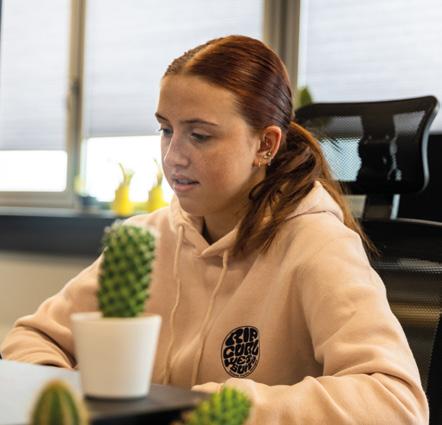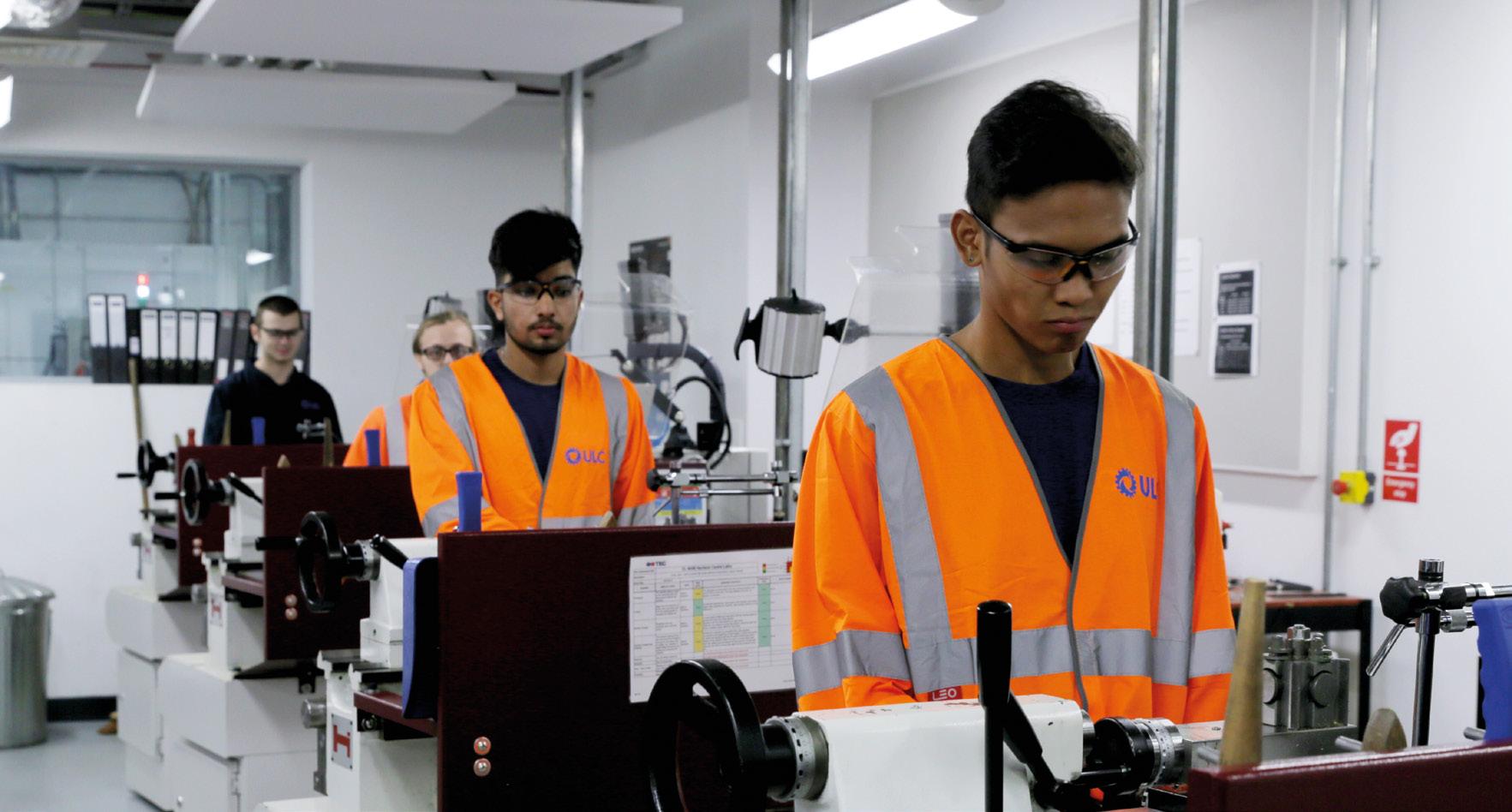



























When you’re looking for an apprenticeship, spread your search as wide as possible. There are many places to look and there is a great deal of help available. This ranges from job seeking on the internet to sending out your CV with a covering letter to employers in your local area.
Some candidates are proactive and send their own CV to prospective employers and as a result secure employment themselves.
Once you have registered with the Northern Skills Training Recruitment Service - we will support you in your search to find a job where you can start your apprenticeship; however, we would also encourage you to visit the following websites, including our own to increase your chances of finding a suitable opportunity:
www.northernskills.co.uk www.gov.uk/topic/further-education-skills/ apprenticeships www.indeed.co.uk nationalcareersservice.direct.gov.uk
www.fish4.co.uk www.monster.co.uk
www.jobsite.co.uk
www.sector1.net www.reed.co.uk www.gov.uk/jobsearch
If you would like to identify local employers to send your CV and covering letter to, please visit:
www.yell.com www.thompsonlocal.com
You may also find it useful to visit some regional news websites to keep up to date with what’s happening in the business world. Here are some to get you started:
www.bdaily.co.uk
www.thenorthernecho.co.uk
www.gazettelive.co.uk
www.darlingtonandstocktontimes.co.uk
www.hartlepoolmail.co.uk
www.chroniclelive.co.uk www.sunderlandecho.com www.northumberlandgazette.co.uk
Please use the links below to check travel arrangements for any jobs you are applying to. This will ensure you only apply for jobs you can get to:
Google Maps
www.google.com/maps
Traveline www.traveline.info

Bing Maps www.bing.com/maps
RAC Route Finder www.rac.co.uk/route-planner
National Rail Enquiries www.nationalrail.co.uk
Your ‘Personal Profile’ should summarise the skills you have gained from both academic and work experience and be related to the apprenticeship you are applying for.
Name
Full Address including Postcode Home Telephone or work use)
Personal Profile
I am a hardworking, honest and reliable individual who would like to have a career in accountancy. I have excellent IT skills being adept with Microsoft Office and I pick up systems quickly. I am able to work effectively in a team as I do playing Rugby with my local team, and I am equally competent and relied upon working on an individual basis as I am trusted to babysit. I am keen to learn and acquire new skills to enhance my overall career prospects of studying AAT to help train in accounts.
Education and Qualifications
School
The ‘Education and Qualifications’ section must include the name of the school or college that you attend/have attended, with the dates you studied there. Your most recent education needs to be first.
Career Summary
Voluntary / Work Experiences
Date: September 2018
In the ‘Career Summary’ section, please include any work experience or jobs you have/have had, including the dates and the duties you completed.
Position Held: Sales Assistant Company Name: Buttercup Hospice
• Working in a team of 5 for a local charity shop
• Serving customers
• Answering the telephone
• Organising fundraising events
Key Skills
• Team work
• Good communication skills
• Excellent time keeping
References
Available on request
The ‘Key Skills’ section could include a list of your skills.
The covering letter and CV is the total package – your golden opportunity to sell yourself to employers. Covering letters that create a good first impression are well constructed, don’t contain any spelling mistakes or bad grammar and support what you are saying in your CV. They highlight your key skills, any experience and enthusiasm and suitability for the role applied for.
A good letter makes an employer sit up, take notice and want to read your CV. It will have more of an impact if it shows the employer that you have done your research.
Your covering letter is a document that is individual to you but there are some general rules to stick to.
Here are our top tips about covering letters to get you thinking along the right lines:
Aim for a one page covering letter, typed up on a computer
Keep the format consistent and use the same font and text size on your covering letter and CV
Aim for a maximum of 5 paragraphs, remember simple is best
Use upbeat and positive language to show how keen you are and avoid exaggerated statements
Ensure there are no spelling or grammatical errors

Where possible, write to a named individual
Your covering letter should be tailored specifically for each application
Be concise and to the point. Try to avoid repeating what’s in your CV
Finally - check it and then check it again
Your covering letter can make all the difference to your application. A persuasive and enthusiastic covering letter is as important as the CV itself. Below is an example of a covering letter which could be used to sell your skills and abilities:
Address and contact details are important for the employer to be able to contact you!
Hiring Manager
Employer Address
Town
Postcode
Dear [title and surname of hiring manager],
Ref: [job title with reference number]
Applicant Address
Town
Postcode
Telephone Number
Email Address Date
If you don’t know the employer’s name, use “Dear Sir / Madam” Include company contact details and job reference (if applicable).
I have recently registered with the Northern Skills to work towards a (put the type of apprenticeship in) apprenticeship. To enable me to start my apprenticeship and fulfil the course criteria it is essential for me to secure employment working within the (put the type of apprenticeship in) environment. I am therefore enquiring whether (put the name of the company) has or anticipates having any placements in the near future.
Example: I am an interested retail assistant looking to discuss with you the current requirements your company has, and how my skills may fulfil those. Having achieved many successes throughout my career, including assisting with training new members of staff and taking a lead role with window displays, I feel I am in a unique position to help your company grow and I would relish the opportunity to bring my skills to your business.
Put in a few sentences why you would like to work for that company (having researched them) and why the job interests you. If you have any work experience or transferable skills explain how these relate to the role you are applying for.
Having already researched your company’s values and products, I was especially interested when I noticed you had recently received an award through the local newspaper for your standard of customer service. This is something that particularly interests me as I too pride myself on delivering a quality service to customers, both new and existing. I feel it would be the ideal company to develop my career and I believe I can be an excellent addition to the team.
Please find attached a copy of my CV, which outlines all of my experience and skills to date. Please don’t hesitate to contact me, should you wish to discuss my application further.
Yours sincerely
Your Name
Use “Yours faithfully” if you don’t know the name of the manager
An interview is a discussion between you and an employer to find out if you would be suited to the job role. It is also a great opportunity for you to sell yourself!
Here is a checklist of the do’s and don’ts.
Dress smartly, look bright and attentive, speak clearly and confidently
Find out where the venue is beforehand, your Northern Skills contact will give you the employer address details to ensure you can get there
Get your outfit ready the night before
Do some research on the company via the internet
Make sure you read the job description thoroughly
Prepare answers for the main questions you might be asked- see examples overleaf
Give a good firm handshake
Quote real examples of when you’ve used certain skills - just saying you’ve got a skill isn’t enough, quote school experiences or hobbies and interests
Take your time when answering the questions - make sure you understand the question and take a short pause if you need to think
Sell yourself as no-one else is going to! Be positive about yourself and your experiences
Prepare some questions to ask at the end of the interview - use it as an opportunity to find out more about the role and the employer, don’t ask about money or perks just yet!
Keep your answers focused and think about what skills you may have to offer the employer
Turn off your mobile phone! Treat the interviewers with respect and give them your undivided attention
Don’t be late!
You never get a second chance to make a first impression.
Don’t swear or use slang words
Don’t slouch in your seat or do anything else that makes you look disinterested
Don’t smoke or have a cigarette just before the interview
Don’t lie! An employer can dismiss you if they find out you have
Don’t have earphones visible
Try not to get too nervous. A few nerves are normal but extreme nerves will affect your performance - remember that it’s not a life and death situation
Don’t be arrogant and assume you’ve got the job. Nothing turns off employers more than someone who is disrespectful and over-confident
Don’t discuss controversial topics such as religion, politics and gender relations
Don’t read from notes or your CV - you should be familiar enough with your own history to be able to talk about it unprompted
Don’t criticise former employers or colleagues -it is not professional
Don’t argue with the interviewer, no matter what. Remember to keep things positive!
Don’t take friends or relatives to interviews, if you need help in getting there, ask them to wait outside whilst you have your interview
Please find below some typical questions you may be asked in an interview
skills
Q. What are your strengths and weaknesses?
Q. Why should we hire you?
It is important that you know your strengths/ skills and mention the ones that are relevant to the job you are being interviewed for. Give examples to support these strengths from any work/life experience.
Typical strengths that employers look for are:
• Communication – both written and verbal
• Problem solving
• ICT – computer/systems
• Attention to detail
• Adaptability
• Organisation skills– ability to prioritise and manage workload
• Enthusiasm – being positive
If you are asked a weakness, think of a minor one which isn’t really relevant to the role but that can be flipped to be a positive.
The employer
Q. Why do you want to work here?
Q. What do you know about us?
Ensure you have researched thoroughly and can share the information you have learned.
Remember the employer doesn’t just want to know if you can do the job, but also if you will ‘fit’ within their working environment/culture.
Q. What do you think will be the main tasks/duties?
Ensure you have read the job description thoroughly and have given thought to how your day/week may look.
Your ambitions
Q. What are your short term and long term goals?
In the short term, it would be to secure the apprenticeship and learn the role, and long term could be to be in a more senior position. Don’t sound too ambitious – i.e. be a Director within 5 years – be realistically ambitious!
Q. What experience have you gained from your previous work, voluntary or paid?
Think about the skills and experience gained relevant to the job you are being interviewed for.
Your work history (if any) – think about clubs – positions of responsibility – babysitting/ prefect etc.
Your motivation
Q. What motivates you?
Try and think of an example when a task excited you.
working
Q. What makes a good team?
They want to see that you are aware of how a good team works and that you are able to work well as part of a team.
Worked out how to get there and how long your journey will take?
If you’ve never been to the venue before, why not do a trial-run a few days before? Take into account rush hour traffic.
Prepared answers to some of the typical interview questions?
Get the inside track on page 8top interview questions.
Researched the organisation?
A simple scan of the website can help you impress the interviewer with your knowledge of their organisation.
Printed out your CV?
This will help you to prepare for any specific questions about your application and your work history.
Prepared examples of when you’ve used skills relevant to the job?
You can identify the kind of skills you will need by reading through the person specification and / or by checking out job profiles on www.northernskills.co.uk
Prepared two or three questions for the end of the interview?
This is your chance to impress the interviewer by asking questions that show you understand the organisation and the role you’d be working in.
Decided what you’re going to wear?
Will you look the part? Always look tidy, even if the dress code at the organisation is informal.
Remembered your certificates?
Most interviewers will want to see evidence of any qualifications you have.
“Studying my apprenticeship through Northern Skills has been a great way for me to develop knowledge and then apply it to my workplace. I would recommend studying for an apprenticeship, as you get to learn on the job and get that workplace experience!”
Grace Davis, Business Administration Level 3 Apprentice at Wander Films

We will treat all candidates fairly and consistently during the selection process
All candidate details will be treated with confidentiality and held securely and in line with the Data Protection Act and relevant legislation
We will provide information, advice and guidance relevant to the candidates needs
We will send your details out to suitable employers with apprenticeship vacancies
We will provide feedback and support following interviews with employers
You will be active with your job search for a suitable job to undertake your apprenticeship
You will keep us informed of any developments or changes to your circumstance such as;
Contact information –address and telephone numbers
Exam results
Driving license/access to a motor vehicle
Job situation
You will respond to any calls or emails sent to you in a timely manner
You will attend any interviews that have been arranged for you
Prior to your interview, you will research the role and plan your travel to avoid turning up late for interview
You will attend your interviews in formal, smart attire
Not to be late. Always try to arrive 10 minutes before your interview time
Make sure to announce that you are there for an interview; don’t expect reception to know who you are. Let them know your name, why you are there and who you are there to see
Make sure you take your coat off - let the employer see that you have dressed appropriately and are taking the interview seriously
Don’t take any drinks in with you and don’t chew gum
Refrain from smoking- you are entering a non-smoking environment therefore any odours will be easily picked up by the employer…first impressions count
Be polite and smile throughout – a good manner is just as important as the answers you provide
Make sure you have some questions to ask at the end of the interview. This shows your interest in the company and the job
Once the interview has come to an end, make sure to thank the employer for their time and the opportunity to interview
A Training Advisor will be assigned to you in order to support and help you to progress through your apprenticeship programme
Your Training Advisor will support you with information advice and guidance about progression routes that may be available to you
Your Training Advisor will continually assess your performance through site visits / classes / training sessions and employer feedback
You will be in attendance at pre-arranged site visits/classes/training sessions
All work set by your Training Advisor prior to visits/classes will be completed on time
You will attend any offsite exams - as required
Your progression throughout your qualification will be discussed with your employer. If you fail to comply with any of the above points then this may affect your employment as an apprentice
What the employer expects of you
To always be punctual and reliable in the workplace
Dress appropriately for your working environment
Show enthusiasm and willingness to learn
Keep an open mind, it takes time to adjust to a new environment
Adhere to your employment contract and policies and procedures listed therein – don’t use social networking sites (Facebook etc.) in the workplace if this does not form part of your job and don’t use your mobile phone whilst at work
Your employer knows you are there to learn – don’t be afraid to ask questions or take notes if you need to
Remember – how you perform during your apprenticeship could determine if you are offered a permanent position (should one become available) with that employer

“Leaving school and not knowing what to do next can be daunting but an apprenticeship turned out to be the perfect route for me.
I’ve built a great career for myself here over the past six years and I love coming to work every day. I’d recommend work placements and apprenticeships to anyone else looking to get into the industry. It’s the best way to get hands-on experience and as an apprentice, you can earn while you learn. It’s a win-win.”
Marwood Former apprentice at BA Joinery
Northern Skills
Tel. 03453 40 40 40
Email: info@northernskills.co.uk northernskills.co.uk
Northern Skills (Middlesbrough)
Middlesbrough College Campus
Dock Street
Middlesbrough TS2 1AD




Northern Skills (Newcastle) The Stamp Exchange Westgate Road
Newcastle upon Tyne NE1 1SA